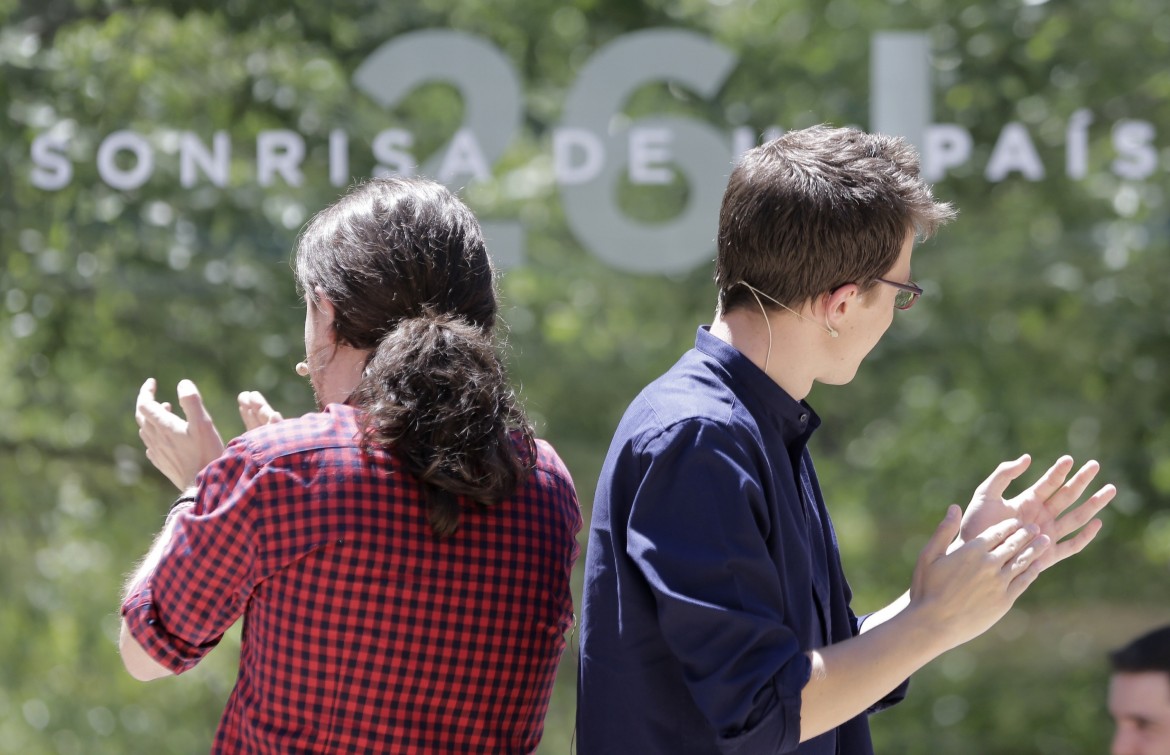Commentary
Errejón and Iglesias, two distinct visions for the future of Podemos
As Podemos gathers this weekend to debate its platform, two factions have emerged. One sees the game as lost. The other sees it as just beginning.

It is not easy to understand the real debate within Podemos, although deep down it continues to be the same debate that actually triggered its creation. I will try to explain that.
The first important issue is that Spain is undergoing a regime crisis. Something that has worked well in the last 30 years was the stability of the political system and a broad social consensus; both were built around the promise of economic growth, social welfare and E.U. membership at the end of the road.
The PSOE has been in many ways the regime’s party. It guaranteed capitalist modernization, it aligned with the interests of the dominant economic groups and it obtained a significant consensus among the working classes.
In 2008, everything broke down: unemployment growth, radical cuts in services and social rights, and the electorate’s radical questioning of dominant parties, accelerated by evidence of corruption as a systemic issue. The second essential factor was the mobilization of 15-M Movement (Los Indignados), an unprecedented mobilization of workers; the middle class, which was undergoing a process of proletarianization; and a generational divide over the future and the expectations of young people. This movement demanded real democracy, social protection and defense of civil liberties.
The third breaking factor is Podemos. Izquierda Unida was not able to get in tune with the practices and demands of 15-M. Podemos was created to make up for this failure. It is the wager made by a group of people from different political practices and traditions that have had important experiences in Latin America, within the political context that has been referred to as “left-wing populism.”
Podemos achieved what Julio Anguita’s party Izquierda Unida could not: It challenged the hegemony of the PSOE. This has dealt a blow to the party system. Citizens perceived clearly that the political class was subjugated to the interests of the financial oligarchy, which controlled banks and businesses and degraded the living conditions of social majorities.
Podemos is not a party, it is a democratic movement with deep social roots and a populist component that makes it a highly specific phenomenon in the European political landscape.
There are many “Podemoses,” and its programmatic, organizational and territorial structuring will be difficult. The leaders are aware of this. This is why Podemos has never had a break. It has been challenged more as an enemy than as an adversary, with a clear objective: to prevent its consolidation as an alternative project. Each internal conflict was overblown and turned into crisis, with a specific goal in mind: to demolish General Secretary Pablo Iglesias.
The internal debate that will end this weekend focuses on an analytical difference that has become a strategic difference. Secretary Íñigo Errejón’s followers believe the regime crisis ended and the oligarchic system has been restored. Thus, the only option is simply to negotiate with the measures favorable to the working classes and the regeneration of the democratic process. He thinks the rights eliminated by the austerity policies are completely lost and that he has to accept the limits imposed by the Treaties and the European Commission.
Iglesias’s side believes the regime crisis is ongoing and that it is critical to develop it further. In addition, he thinks it is essential to dispute the hegemony of the ruling tripartite (PSOE, PP and Ciudadanos), starting a constitutional process that guarantees social rights and the creation of a federal state.
A decisive debate element is the relationship with the PSOE, which is undergoing a very serious crisis. According to Errejón, they should cooperate with the Socialists and, from this position, contend their electoral hegemony. According to Iglesias, the PSOE is part of the ruling forces that are in bed with the strong powers. The party model defended by Iglesias is closely related to the strategic direction defined above: that is, to go from an electoral machine party to a mass party, firmly engaged in the territory, linked to social conflict and the movements, with a capacity to propose alternatives from the point of view of the lower classes.
Formally, no one questions Iglesias’s leadership. But the basic issue is what type of political leadership to build, from the organizational point of view. Unlike Errejón, Iglesias defends the idea of a cohesive direction around a policy of democratic rupture that avoids the crystallization of internal groups and a division of internal power into quotas and political families. Plurality and respect for minorities, led by a single vision to ensure unity of action.
Manolo Monereo is a member of Podemos in the Spanish Congress of Deputies.
Originally published at https://ilmanifesto.it/errejon-e-iglesias-due-visioni-distinte-dellazione-politica/ on 2017-02-10
